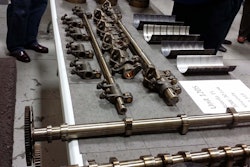
At some point in 2016 or 2017, diesel engine oil proposed category 11 (PC-11) will debut in North America.
While an introductory date is still up in the air, the makeup of the PC-11 category is beginning to come into focus, says Dan Arcy, OEM technology manager at Shell.
Arcy says the proposed category is expected to rely on lower viscosity oils to reach emission-focused parameters being discussed for the category by the American Petroleum Institute (API).
And despite industry-wide concerns about the impact these lower-viscosity oils will have on the engines using them, Arcy says there are reasons to be excited about what PC-11 will offer in the marketplace.
“The customer concern with [PC-11] has been ‘Is it going to protect my engine?’” says Arcy. “In our testing, we’re not seeing any issues [with engine performance and life].”
What Shell is seeing, Arcy says, are fuel economy benefits.
With more than 18 million miles of testing complete, Arcy says Shell is seeing an average of more than 1.5 percent fuel economy improvement with PC-11 rated oil. And the reason is directly correlated to the oil. At lower viscosity, it takes less energy to pump the oil through the engine, he says.
In addition to nearly identical engine performance compared to higher viscosity 10W30 and 10W40 engines, Arcy says fleets also should be confident that engine resale values will not be impacted by the new category.
And Arcy says Shell’s testing isn’t the only area where fuel economy benefits have been found. He says several fleets also have tested Shell’s PC-11 low-viscosity product in recent months and found savings nearly identical to Shell’s results.
As for accessibility, Arcy says he doesn’t know yet if PC-11 oil will be backwards compatible for earlier engines. He says that’s something oil manufacturers and the API will need to identify before the oil reaches the market.
He says discussions with OEMs show they will be on board with the new category changes, and if backwards compatibility is possible, it will be done.










